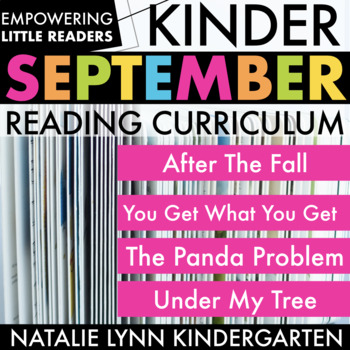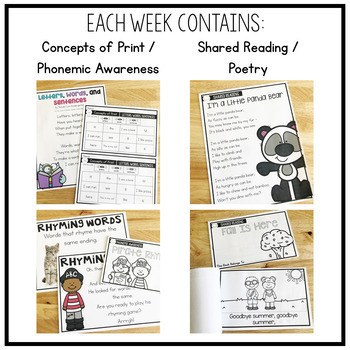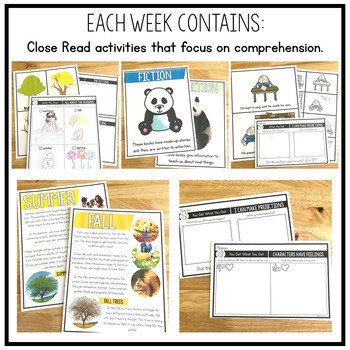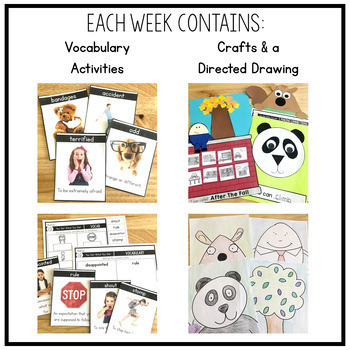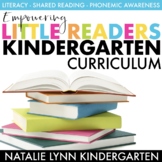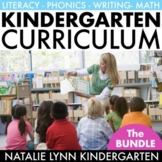Kindergarten September Read Aloud Lessons | Empowering Little Readers
- Zip
What educators are saying
Also included in
- Kindergarten teachers, are you looking for something to make planning for your whole group literacy block or Reader's Workshop time easy, fun, and developmentally-appropriate? These kindergarten interactive read aloud units contain everything you need to teach foundational skills, phonemic awarenessPrice $55.00Original Price $100.00Save $45.00
- Teaching kindergarten has never been easier! This kindergarten complete curriculum bundle includes systematic, research-based, age-appropriate, and EFFECTIVE curriculum for kindergarten. Everything you need to teach effective lessons in kindergarten is included.This curriculum is designed with classPrice $250.00Original Price $440.00Save $190.00
Description
Kindergarten teachers, are you looking for something to make planning for your literacy block or Reader's Workshop time easy and fun? This Empowering Little Readers September reading unit contains everything you need to teach phonemic awareness, comprehension, story elements, shared reading, and vocabulary. This unit is based on the close read model - each week you will focus on one book and going deeper within that text.
Digital Options for Distance Learning: I have added in options for some of the recording sheets to be used in Google Slides™ and Seesaw™. I was not able to make all activities digital, but most.
*This is available in a yearlong bundle here: Little Readers Kindergarten Curriculum
Each week contains 5 days worth of lesson plans for you with foundational or phonemic awareness activities, shared reading (poetry), a whole group reading lesson, independent work, vocabulary, crafts, and directed drawings.
How long will a lesson take? You can fit these Kindergarten interactive read aloud lessons into the time limit that you have. There may be more included than you can use, and that's okay! A suggested time frame:
- Interactive read aloud with mini lesson and discussion - 15-25 minutes
- Independent practice - 5-10 minutes
- Phonemic Awareness Lessons - 5 minutes
- Vocabulary - 5-10 minutes
- Shared Reading - 5-10 minutes
- Kindergarten mentor sentences and grammar - 5-10 minutes
What is included in each unit?
After The Fall
- Lesson Plans
- Phonemic Awareness Lesson Plans
- Letters, Words, and Sentences Song
- "Humpty Dumpty" Poem
- Poetry Notebook Pages
- Poem paper reader
- Retell Pictures
- Comprehension Printables
- Vocabulary Picture Cards
- Vocabulary Printables
- After the Fall Retell Craft
- Humpty Dumpty Directed Drawing
- Kindergarten mentor sentence with lesson places
- Grammar mini lessons: nouns
You Get What You Get
- Lesson Plans
- Phonemic Awareness Lesson Plans
- Rhyming Words Poster
- Name Game Poster
- "You Get What You Get" Poem (2 versions)
- Poetry Notebook Pages
- Poem paper reader
- Comprehension Printables
- Vocabulary Picture Cards
- Vocabulary Printables
- Melvin Making Connections Craft
- Melvin Directed Drawing
- Kindergarten mentor sentence with lesson places
- Grammar mini lessons: nouns
The Panda Problem
- Lesson Plans
- Phonemic Awareness Lesson Plans
- Rhyming Words Poster
- Pirate Rhymes Poster
- Rhyming Real Photo Cards
- Silly Voices Fluency Cards
- "I'm A Little Panda Bear" Poem
- Poetry Notebook Pages
- Poem paper reader
- Comprehension Printables
- Fiction and Nonfiction Posters
- Panda Bears Nonfiction Book
- Vocabulary Picture Cards
- Vocabulary Printables
- Panda Bear Craft
- The Panda Problem Directed Drawing
- Kindergarten mentor sentence with lesson places
- Grammar mini lessons: verbs
The Panda Problem
- Lesson Plans
- Phonemic Awareness Lesson Plans
- Rhyming Words Poster
- Pirate Rhymes Poster
- Rhyming Real Photo Cards
- Silly Voices Fluency Cards
- "Fall Is Here" Poem
- Poetry Notebook Pages
- Poem paper reader
- Comprehension Printables
- Author's Purpose Poster
- Through The Seasons Nonfiction Book
- Vocabulary Picture Cards
- Vocabulary Printables
- Colorful Leaves Craft
- Tree Directed Drawing
- Kindergarten mentor sentence with lesson places
- Grammar mini lessons: nouns and verbs
FREQUENTLY ASKED QUESTIONS
What are the benefits to using Kindergarten interactive read aloud lessons in your classroom? Interactive read alouds give your read alouds purpose! They allow you to meet standards in an engaging way while using picture books as mentor texts to teach comprehension strategies. They also give students a connection to new vocabulary words.
These books seem too hard for my Kindergarten students! You, the teacher, will be reading these books to students whole group. They will be working on comprehension strategies while listening to the story. These interactive read alouds will not take the place of your phonics instruction or small group reading instruction.
How would you suggest fitting these interactive read alouds into my ELA block? These kindergarten interactive read alouds would take place during your whole group reading curriculum (classroom read alouds). This might look like:
- Phonemic Awareness Mini Lesson - 5 minutes
- Shared Reading - 5 minutes
- Empowering Little Readers Lesson - 20 minutes
- Students complete independent practice from the lesson (this is their ticket to centers) - 5 minutes
- Literacy Centers and Small Group Reading - NOT in this curriculum
- Phonics Lesson and Practice - NOT in this curriculum
- Vocabulary Mini Lesson - 5 minutes
- Mentor Sentence and Grammar Mini Lesson - 5-10 minutes
What are the benefits to using mentor sentences in Kindergarten? Mentor sentences allow Kindergarten students to work on concepts of print, fluency and reading with expression, and grammar skills while relating to their read aloud.
What do the Kindergarten vocabulary lessons look like? The kindergarten vocabulary lessons are short mini lessons. Each week will focus on 4 vocabulary words that come from the interactive read aloud, which will give students a connection to the words. Students will learn the vocabulary words with hand motions, define and illustrate the vocabulary words, and match the words to pictures.
What does shared reading look like in Kindergarten? Shared reading is kindergarten poetry. All kindergarten poems included in these units are original poems written by me! Each day, you will read the October poems together for fluency. Students will receive their own October poems to put in a poetry folder or notebook. They will also receive a paper poem book for each poem.
What do the kindergarten phonological and phonemic awareness lessons look like? These are quick, teacher-directed phonological and phonemic awareness mini lessons. They are scripted for you. Some weeks include a game and/or worksheet, but not every week.
Questions? Email me at natalielynnkindergarten@gmail.com

